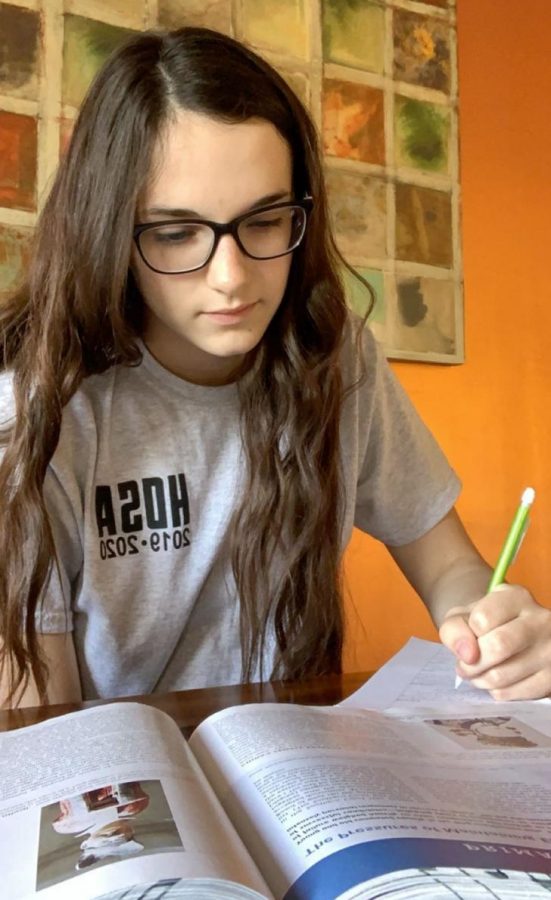A new place for Advanced Placement
AP national exams move online during pandemic
Preparing for her national exam, sophomore Kaitlyn Vontz takes notes and rereads materials from previous units. Vontz has been preparing for the Advanced Placement World History exam since the beginning of the semester and has been working even harder since the announcement of the test being held online. “I have been taking full advantage of the extra online review sessions that my teacher has given us during quarantine,” Vontz said. “The changes to the exam have made it difficult to learn the new format, but I have been putting in a lot of extra work to make sure I succeed.”
April 29, 2020
Due to school closures and the inaccessibility of the typical test-taking environment, it was announced on April 3 that the Advanced Placement national exams will be held digitally for the 2019-2020 school year. The online exams will take place from May 11-22. Makeup tests will also be available at the beginning of June.
With the changes to the exam conditions comes a transformation in the format. One of the most noticeable and significant changes that can be seen in the layout of this year’s exams is the length. Students in the past were allotted between two to three and a half hours to complete the assessment. The new circumstances have caused the test to be shortened to 45 minutes, which includes the five-minute time allowance for submitting work.
As a result of the decrease in time, a large percentage of the content covered has been removed. According to the College Board, a majority of the exams will be made up of one to two free-response style questions that were specifically designed for at-home administration.
The new national exam format will also only include material that most schools have already covered at this point in the academic year. The goal of this change is to relieve the stress of learning complex content digitally.
“Preparing for any Advanced Placement exam is difficult and stressful for students, especially if it is their first AP Exam which is the case for most of my students,” AP Human Geography teacher Megan McEnaney said. “I am so proud of my students for continuing to master information and remain dedicated to their learning during this time.”
In the past, the tests were proctored by staff members which eliminated the use of unauthorized materials. The new changes to the exam make it difficult to monitor the progress of students and materials used in the testing environment. To eliminate this issue, the national exams will be held in an open note format.
In order to insure the security and integrity of the national exams, the College Board has reiterated that they will be using software to detect any plagiarism. They have also stated that they will be submitting all work back to teachers so they can look for any inconsistencies.
“Initially, I think there was some uncertainty, but I think that our AP teachers have done an excellent job of setting the tone and preparing the students for when the test comes,” assistant principal Jennifer Allen said. “Students at Millard West are getting quality instruction and our AP teachers are committed to preparing their students for the exam.”
In previous years most teachers have offered in-class review opportunities or review sessions before and after school. Due to the new circumstances, many teachers have created digital review sessions and extra review materials to benefit both students in their current classes and their students from the fall semester.
“Students who look at practice questions, review their notes and make use of the resources provided by teachers in our building and the College Board tend to benefit from review sessions,” AP Language and Composition teacher Michael Catron said. “I don’t think an online vs. in-person session will change this dynamic.”
Millard West students have been adapting throughout the quarantine to tailor the skills they had been perfecting for the previous assessment’s configuration to the new testing style. Students have been working with their teachers, collaborating with peers and attending review sessions online to make sure that they are as prepared for the national exam as they can be.
“I have been focusing more on practicing the new elements of the test instead of the previous test components,” sophomore Kyra Nordmeyer said. “When they took out the later units, it gave me less to study and remember from the fall semester which has helped me to prepare more successfully.”
Although the changes to the national exam are not ideal for those who have been preparing for it all year, students are working hard to excel with the help of their teachers.







